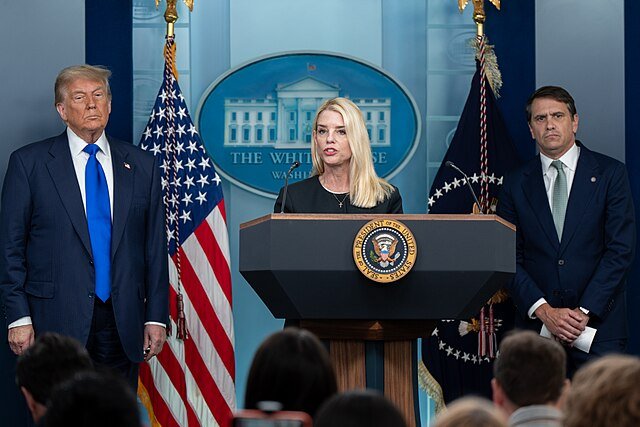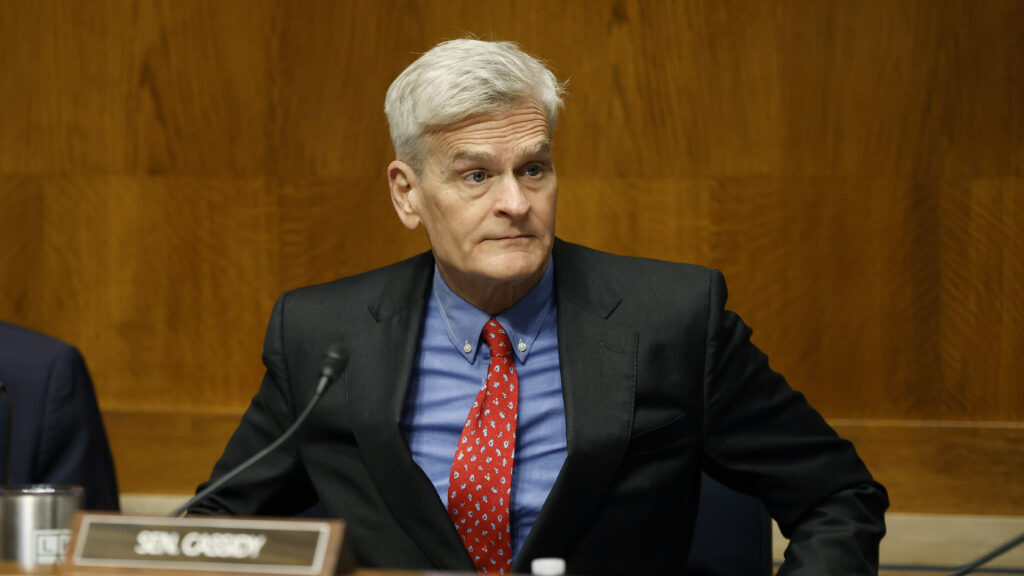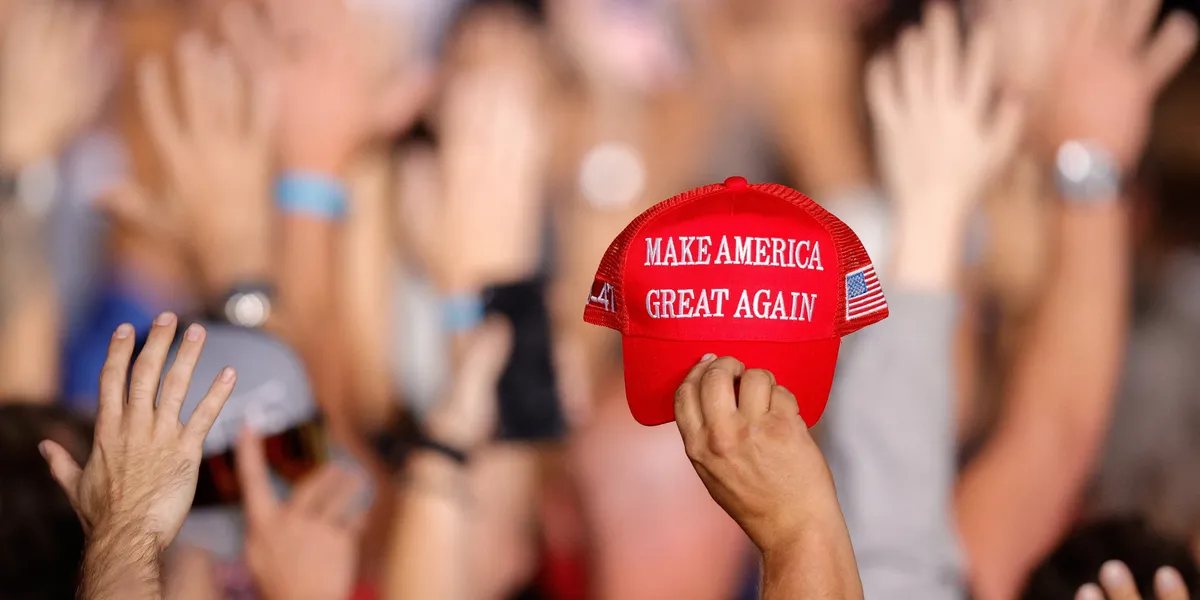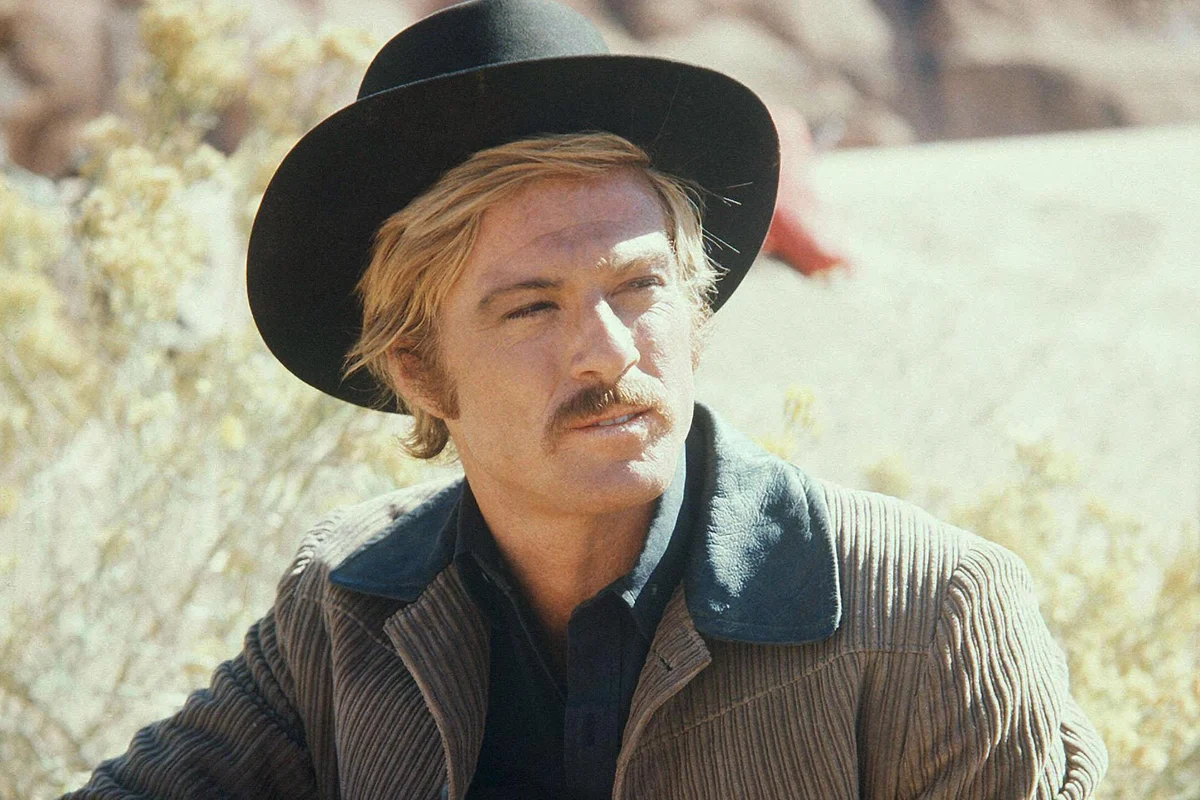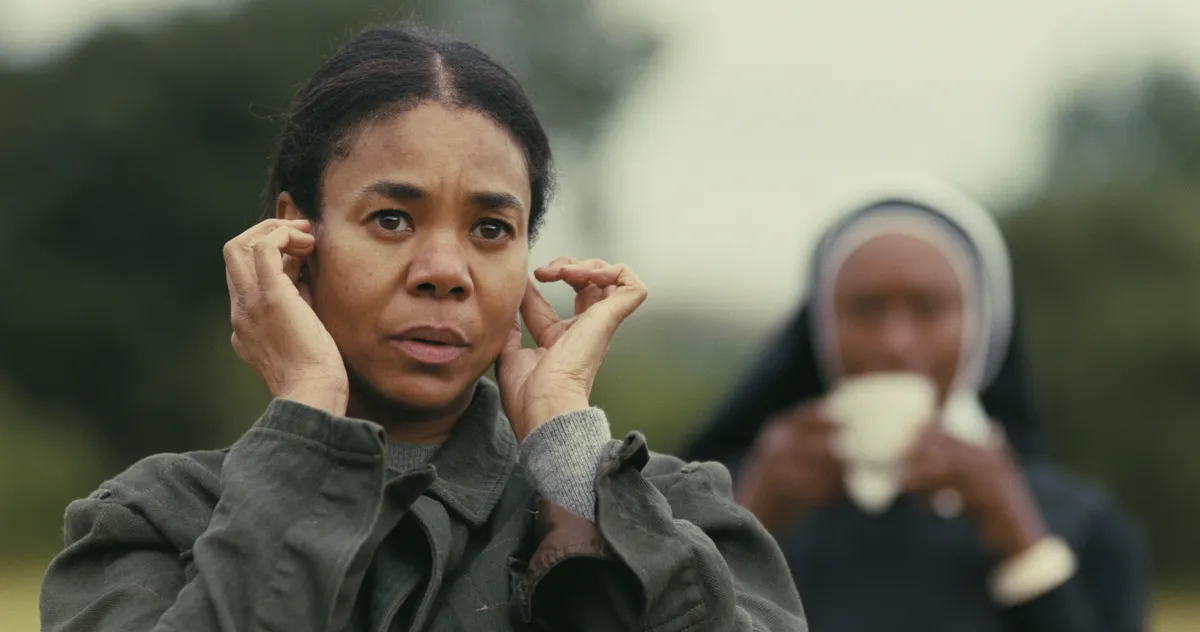
Regina Hall’s inherent Regina Hall–ness — her magnetic fusion of poise and charisma — never shows in One Battle After Another. Instead of that usual charm, Hall is sober-minded and serious. As Deandra, a guerilla involved with a revolutionary sect called the French 75, she’s waging war against oppression, whether that’s militarized police, migrant detention camps, Christmas-worshipping white nationalists, or fascism at large. Paul Thomas Anderon’s newest movie is very much a comedy, but Hall is mostly on hand during its graver political insinuations. Even as the French 75 splinters, Deandra remains committed to the cause, resurfacing when called to shepherd the targeted teenage daughter (Chase Infiniti) of a dopey ex-radical (Leonardo DiCaprio) to what she hopes will be safety. To fail the mission would be to fail herself.
Having made her name with The Best Man, Scary Movie, and Ally McBeal, this new, different note satisfies Hall’s longtime dream of working with Anderson. They’re neighbors in Los Angeles, and one day the director approached her to say that, finally, he had a part for her. One Battle also exemplifies where Hall’s career has taken her, which is to say across genres, moods, and Hollywood whims. Even when she’s bossing her way through movies like About Last Night and Little, Hall’s well-dressed polish carries an immense likability. Soon enough, Hall will return to the Scary Movie franchise for the first time since 2006. But for now, she’s soaking in the momentum around One Battle. To her, this film is “special.”
Not every movie can be special. What’s different about this one?
You certainly don’t feel it with every job. The timing of this movie feels divine. This certainly isn’t what the film is about, but it couldn’t feel more pertinent to many things that are going on. It’s also a time when we really need to laugh, and there’s a lot of levity in the way the story is told.
It’s fascinating that Paul wrote this movie in 2023 and shot it in early 2024, before our current president had been elected.
And Paul actually started thinking about this project 20 years ago.
Based on Vineland.
I think he was going to shoot it as early as 2017. Now it’s just incredibly — let’s call it psychic.
Did you, Paul, and the rest of the cast discuss its real-world politics while making the movie?
You know, we didn’t. We discussed the world that Paul wrote about and what would feel real. We were looking for authenticity. I read books about these times in our history and what revolutionaries are like, so it was, What’s truly in the heart of these characters? What do they do? Why do they do it? How do they feel about it? I think it’s taking the judgment off of it, and that includes the Christmas Adventurers with Tony Goldwyn and all of them.
That divinity you talked about, though — in the months since you shot it, we’ve seen federal troops sent into cities, new migrant detention camps, and political violence. Was there a moment when everyone involved realized the movie’s relevance had been magnified?
Just speaking for me, I certainly thought that. I think there’s no way to be informed and not see some commonalities.
What did Paul tell you about why he thought of you for this role?
He didn’t say why. He said, “I have a role I would love for you to do,” and I was like, “Yes.” Deandra is not a role that I’ve played before, but I didn’t wonder why he thought of me. I’m gonna ask him. When he told me about it, he said he’d give me the script, and I didn’t get it until a few months later. I was like, Oh boy, did he forget? Did he change his mind? It’s interesting to see what someone sees in you.
Now that you’ve had such a wide-ranging career, how do you think you are perceived as an actress?
I think I am perceived in many different ways. I haven’t thought about it. I don’t know! How do you perceive me? It’s a good question.
I think you’re primarily perceived as a comedic actress, but I think that canvas has broadened. One thing I notice is that you often play ambitious characters, and many of those characters are high glam. It goes back to Ally McBeal. We see it in About Last Night, Little, Black Monday, Honk for Jesus. Save Your Soul — ambitious characters who are also very presentational. Deandra, in her own way, is quite ambitious, but without the glam. That’s an interesting change. I guess you could say the same thing for Master.
Maybe Support the Girls.
Yes, although your character in that film, Lisa, is very put-together in spite of what’s going on in her life.
Yeah, a small-town kind of put-together. Even Dawn in Black Monday was very put-together, but she was a mess. Deandra is probably the most stoic character that I’ve ever played, coming from characters that are quite verbose or animated, like Brenda in Scary Movie. There was a lot of performance that had to exist nonverbally, and that was certainly different. With revolutionaries and what they’re doing, anything else wouldn’t feel honest.
Was there a moment when you first saw yourself in that all-black, seemingly makeup-free look?
Paul did a lot of camera tests just to see what cameras he was going to use. I think my first time in wardrobe was my first test, which was with Shayna — Junglepussy — and I will say, it felt alive. Deandra is stripped of many things, but she’s strong. I was in the beginning stages of working with PTA, and that had always been something that I really wanted to do. I was about to experience a dream. And the next time we toyed with the cameras, Leo was there. It was building, and it was such a ride.
You mentioned reading about revolutionaries and this particular type of activism. What of that did you put into Deandra?
I talked to people who had been a part of the Black Panthers. For me, it wasn’t about what they did. It was about, “What did you feel like, and what did you think you were doing?” Many of them were very young, and it’s a very idealistic time. You think that you’re going to be at the beginning and on the precipice of change, so I really was curious about the idealism in terms of what they were up against and who they were fighting for and how. Deandra is still part of the fight all those years later, so I used that to create her backstory. When you’re young, you kind of think you’re the first to have gone through something.
Did you come away with any grand ideas about this particular type of extremist activism?
There’s something to be said about the human spirit when it believes that it is right, when you believe you have cause or reason or purpose. What was interesting in Paul’s movie is we see that, with Willa, it continues. Whatever a collective believes in, it continues. For me, it was really wonderful to meet people who fought but who believed their purpose is to do good. There was a self-righteousness that they held about it. With the French 75, we saw goodness from them, even if many times things do go wrong. I walked away with more understanding of idealism.
Tell me about your first encounter with one Leonardo DiCaprio.
In real life, I saw him somewhere years ago, said hi, and that was it. When he and Teyana met, they had a big moment at Diana Ross’s birthday party. I had just seen him around. I think the first time I spoke to him was when we had our work session where we were auditioning with Chase. From then on, he was very funny, great to work with, and sweet. He was down-to-earth.
In terms of where culture has gone, it feels like there’s a sort of spiritual progression from screaming into the void at the end of Support the Girls to the all-out political scream that this movie lets out. Several years out, can you take in what that Support the Girls ending has meant to people?
Gosh. Support the Girls was such a special film. In doing research, I went to a lot of those restaurants, and I was surprised to see that there did exist this familial feeling — how protective some of the female managers were and how hard-working people were. With the scream, it’s that cathartic moment that we all need. After what had happened to all of them, in those last moments, they got to be together. I didn’t necessarily know how it would resonate, but I loved the ending when I read it. I think all of us knew what that scream meant.
What did it say on the page?
It just said, “They let out a scream.” I don’t know if it explained it or not, but I inherently knew what it meant. I remember when I read the script, I was thinking, Oh my goodness, what does she do? Something terrible? She’s going to steal the money. I was so used to reading that sort of thing. But they were just people, and when they screamed at the end, it’s a moment where life’s been a little bit hard. The whole film just had a sweet feeling. Ironically, Paul Thomas Anderson went to see the movie, which I gather he enjoyed. Junglepussy is in it!
I wondered if there might have been something in Support the Girls that Paul pinpointed for Deandra.
That would make sense. Lisa in Support the Girls went through everything to take care of those girls, and Deandra does have a heart and a capacity to be incredibly selfless. We talked about the moment in One Battle After Another at the end when they got caught. She feels like she failed. She doesn’t have the girl anymore. That was her job. She wasn’t five steps ahead, and I think for her, she had failed the mission.
When Support the Girls came out and got all that acclaim, a lot of Oscar pundits were rooting for you to get a nomination. Was it a disappointment for that not to come to fruition?
No. I had never really thought I was necessarily in the conversation. I was really happy with all the critical acclaim that the film had gotten. It would have been great, but it wasn’t anything I was disappointed by. Because it was an independent film, I was really, really thrilled to get the Gotham and Indie Spirit nominations. That was truly like the pinnacle for me because it’s an indie film.
What have you observed thus far about the early awards-season momentum that One Battle After Another is picking up?
The great thing is that the critics have really responded well, and audiences who have seen it also love it. You want the people to love it. I haven’t gone beyond that, but it’s incredible to feel that amount of energy surrounding the film from the start.
One of the movies that launched your career, Scary Movie, required a type of broad comedy that I think a lot of actors probably can’t pull off. What was your audition like?
I had about four or five. I had a lot of auditions. I hadn’t done a comedy. I had only done The Best Man. I had to preread for casting, and then go in for casting, and then go back, because this was when you were not submitting a tape. You had to go in person and do callbacks, and then another set of callbacks for Keenen Wayans. It was exciting. I wasn’t the first person cast. I was cast in the movie-theater scene, which was a separate scene, as Marlon’s cousin who was coming to visit. Brenda was a different character. A wonderful actress, Tamala Jones, had been cast, but Tamala couldn’t do it. They were going to offer Brenda to someone else, but the studio said, “We like this girl right here,” which was myself. Keenen combined the roles. It was a long process — months!
That feels like a tough audition to me because you might not know exactly what tone the movie is going to take until you’re making it.
One scene I for sure did was the movie-theater scene. And where I talk to Cindy in the beginning and say, “She’s as fake as press-on nails.” Really, at that point, regardless of getting the movie, I just wanted to make Keenen laugh. I was a big fan of his from In Living Color. I was excited for any part that I could have gotten. I thought I was just going to go work for three or four days in the movie theater, so when I found out it was going to be run of picture, I didn’t even know what comedy was, necessarily. I didn’t know anything about intonation, and I was so green.
How did your experience of the franchise change once Keenen and Marlon left after the second movie?
Yeah, that was tough. You never know what’s happening with the powers that be, but it was scary. Anna Faris and I had to just be like, “Okay.” David Zucker and Craig Mazin were great too, but it’s great to be able to go back with that history. We’ve come full circle.
The Wayans are returning for the first time since Scary Movie 2. Was their involvement crucial in your agreeing to do another one?
Hm. Yes, I would say so. It was really important to have the original cast and directors back from Scary Movie 1 and 2 because that’s what made it nostalgic.
In the years since Scary Movie 5, the horror genre has really widened. Are we going to get a parody of the whole A24 elevated-horror thing? Feels like an obvious target.
I don’t think so from what we’ve discussed. I signed my NDA and I should be getting something any second now.
Oh, you haven’t seen a script yet?
I have seen a very early draft, but that script has since had rewrites and other ideas. It sounds amazing.
Did you really sign an NDA?
Yes, I did.
Is that because this is such a high-profile franchise?
Yeah, but it also is dependent on the jokes not being known.
You and I spoke in 2021 when Nine Perfect Strangers was coming out, and at the time, you told me that you were writing an anthology series that Showtime had picked up, and Barry Jenkins was attached as a producer. What’s happened with that in the years since?
Yeah, that was a tough one. Barry was doing Lion King, which was great, and at the time it was at Showtime. It’s done, and we’re headed out to pitch it now to networks. Hopefully we’ll know soon where it will have a home.
When you say it was a tough one, do you mean because it didn’t come together as quickly as you might have liked?
No, but we had done a lot of work and there were many changes that happened at Showtime. My executive left, and then you get it handed back to you. I think the timing for us was just tough.
We’re talked about the range you’ve shown over the years, and you said working with Paul Thomas Anderson is like living out a dream. What else are you hungry to do?
If you would ask me a year ago, I certainly wouldn’t have thought about a revolutionary. I just want to be in great hands and be able to have fun. I look forward to Girls Trip 2. I want to do some jobs that are scary and out of the box. I feel like my career has been a journey, and I look forward to the journey because it’s always better than I can imagine anyway. Imagine calling and telling your agent you got a PTA film!
